Ballots, smoke, and champagne

Cardinal-electors, below 80 years old, three Filipinos included, will be locked up in the Sistine Chapel to deliberate, reflect, and vote. Conclave, from Latin or Spanish “con clave (with a key),” literally states the cardinals can’t leave till they declare “Habemus papam! (We have a pope.)” In the internet age, when news travels as fast as one click, the Church clings to a 15th-century tradition, and will first announce the election of a new pope with smoke signals!
White smoke from burned ballots that emerges from a chimney in the Sistine Chapel is greeted with joy, while black smoke from ballots mixed with wet straw, signifies another round of voting. When the Cardinals didn’t mix things right, gray smoke confounded those waiting outside. Smoke is high tech today, with two stoves: one for the ballots and another for chemicals. Smoke from these two stoves combines and, with the help of fans, is emitted from the historic chimney. Marked cartridges leave little room for error. Potassium chlorate (KCI03), lactose, and rosin (a distilled pine resin, aka Greek pitch or colophony) produce white smoke. For black smoke, the cocktail mix is Potassium perchlorate, anthracene (from coal tar), and sulfur, which are burned. This reminded me of college chemistry I barely passed.
The conclave and May 12 elections on Monday prompted my last column on Emilio Aguinaldo’s election protest during the 1935 Commonwealth elections. Going further, there was a Madrid election in 1891 that marked the split between Jose Rizal and Marcelo H. del Pilar, and the expatriates split between “Rizalistas” and “Pilaristas.” Magdiwang vs. Magdalo? Nacionalista vs. Liberal Party? PDP, HNP, Otso Diretso, UniTeam—the issues are not new. It’s in our DNA.
Many of Rizal’s restrained but angry letters to Plaridel have survived, but the only detailed account of the source of their rift is from Plaridel and it boils down to champagne. Plaridel wrote his brother-in-law Deodato Arellano on March 31, 1891:
“I owe you my explanation of what you call a conflict between Rizal and myself … There was no such conflict between us nor among members of the colony, but in the election for leader there were Rizalistas and Pilaristas … even now I call it childishness.
“It is a tradition in the colony to have a fraternal dinner on the night of December 31 [New Year’s Eve]. In the morning of that day, the question of serving champagne was brought up in our lodgings, all the more since the boys had taken a great deal of trouble preparing speeches. A thousand ways were discussed to make champagne available that night, and at lunch time there was a great deal of chaffing about it among ourselves, but I kept my mouth shut, and without saying a word was planning to pay for the champagne myself; I wanted to give them a surprise. No sooner said than done; after lunch, I went to Bayo’s house to get hold of some money for the night’s champagne … at three in the afternoon, invited to Justa Jugo’s for the birthday party of her son … Rizal [told me] ‘Before coming here I passed by your house and saw a resolution being prepared asking you to pay for the coffee tonight.’ ‘Aceptado,’ I replied. Imagine, how could I not agree when I was ready to pay for something more expensive.”
That night a resolution by Eduardo de Lete, signed by 25 of the 31 guests at the party, was read stating that Del Pilar would pay for coffee, Cunanan would cover the cigars, while Rizal and Dominador Gomez would split the cost of the champagne. Del Pilar and Cunanan naturally accepted:
“But Rizal had the good or bad taste to protest and argue. I tried to head off his protest by suggesting that the champagne be paid for by Modesto Reyes and Mariano Abella, who agreed to do so … but perhaps because Rizal did not hear me, we being far apart, I at the head of the table and he at the extreme left, with the authors of the resolution on the extreme right, my suggestion … was not taken up and, on Rizal’s initiative, he began at the left of the table to collect one peseta per person to pay for the champagne. In the midst of the hubbub someone approached me and whispered: ‘Señor Editor, the resolution is withdrawn but we are grateful for your kindness with regard to the coffee; we expected nothing less from your generosity.
“I understood the bitterness that Rizal’s protest had aroused. [Lete] who was oblivious to it, continued gay and witty while I worried about a quarrel breaking out. The collection of one peseta was paid to the left end to the center of the table, but from there to the right end nobody wanted to contribute.
“Witticisms, very ingenious and wounding, began to be directed against Rizal from the right end, but I took advantage of the fact that Rizal did not seem to realize the point of the jokes and stood up to approach those at the right end and asked confidentially not to spoil such a fraternal gathering. They all listened to me and there were no more jokes for the rest of the dinner.”
The next day, an election was held. Rizal, claiming a lack of unity, resigned and left, never to return. Surely, there is more to this than champagne. A clash of egos?
(Conclusion on Friday).
Ambeth is a Public Historian whose research covers 19th century Philippines: its art, culture, and the people who figure in the birth of the nation. Professor and former Chair, Department of History, Ateneo de Manila University, he writes a widely-read editorial page column for the Philippine Daily Inquirer, and has published over 30 books—the most recent being: Martial Law: Looking Back 15 (Anvil, 2021) and Yaman: History and Heritage in Philippine Money (Bangko Sentral ng Pilipinas, 2021).


















